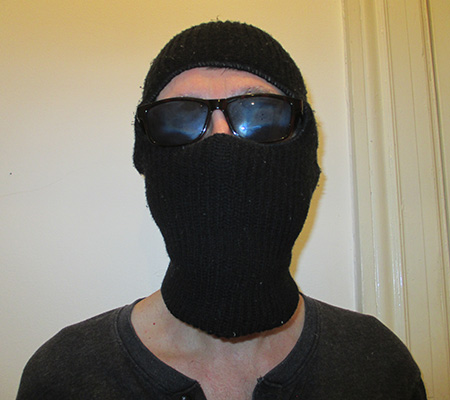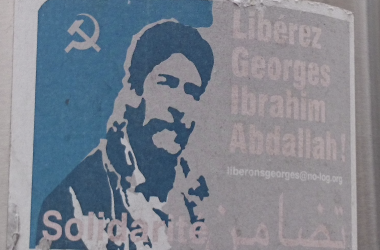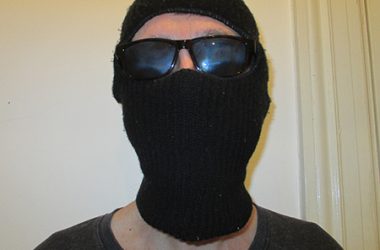An Interview with Ulrike Meinhof’s Sister Wienke
When Ulrike Meinhof died forty years ago, she was 41 years old, her sister Wienke, 44. The sisters each had their own political histories, from which they shared a lot with each other. After the arrest of her sister in 1972, Wienke became increasingly active in opposing the prison conditions and in support of the prisoners from the RAF and their release. In an interview with Ron Augustin, she speaks about Ulrike’s political development, incarceration and death.
RA: There is a documentary on Patrice Lumumba (the first prime minister of the Congo) which shows that it took forty years to uncover the exact circumstances of his assassination. When you saw the movie, which was produced by Holger Meins’ fellow student Thomas Giefer,[1] you said, maybe it will take forty years before we know what happened in Stammheim. Are there any new developments?
W: No, the findings of the International Commission of Investigation, which were announced at a press conference in Paris in 1979,[2] revealed so many inconsistencies in the official inquiry that virtually the only effort has been to sweep them under the carpet. I don’t want to enumerate them all again, but Ulrike is said to have hanged herself from a window bar which was hidden behind a thick wire-mesh screen. Police images in the files of the official inquiry show her left foot still rested on a chair when she was found. The loop in which she was hanging was so long and so fragile that her head would have slipped out or the strap would have torn if she had jumped. The lack of haemorrhaging in the eyes and other factors seemed to indicate external involvement, and the International Commission concluded that my sister must have been dead before she was hanged.
RA: Who do you suspect?
W: I can only speculate. But there was a fire escape, a completely separate stairwell which led from outside into the seventh floor directly next to her cell. So, anyone could have gained access without being seen.
RA: How did you learn of her death? Were you able to see her?
W: May 9, at 9 in the morning. I heard it on the news, so I immediately drove to Stammheim with her lawyer Axel Azzola. When we arrived, the body had already been removed. Gudrun Ensslin wanted to see her, but the federal prosecutor would not permit it. I had to identify my sister before the autopsy, but couldn’t see her other than that. Azzola managed to get permission for us to talk to Gudrun, and that’s when I saw her for the first time. She was so worn out that she could hardly speak. I don’t remember what exactly we discussed, but she told us about her last talk with Ulrike, the night before, at the window, where they had both been joking. The same day, the lawyers held a press conference in Stuttgart, where I got up and said that when she was still in Cologne-Ossendorf, Ulrike had clearly told me, “If something happens to me in prison, it will be murder, I will not hurt myself.” At that point, she was still in a dead wing, totally isolated.
RA: Public prosecutor Kaul spread rumours in the media that there were tensions between the prisoners that had “driven the RAF’s chief ideologue to her death.” Some extracts from letters were published to prove it.
W: In fact, these extracts had been taken from a discussion which had been difficult, but which at the time had been over and done with for almost a year. Gudrun mentioned a “process of consolidation” amongst them. Because the extracts from the letters had been taken out of context and were partly forged, the prisoners released the entire correspondence through their lawyers. Of course, the media never corrected their lies.
At the end, Ulrike and the others in Stammheim were working on texts for the trial. In the courtroom, on May 4th, 1976, they spoke about Germany’s role within the imperialist state system. At that moment, Ulrike was not in the room, but was in a visitors’ cell under the courtroom, where, with her lawyer Heldmann, she was preparing the next statement for the trial. This petition, on the role of (former German Chancellor) Willy Brandt and the Social Democratic Party in the Vietnam War, was presented at the trial by Andreas Baader. On May 6, she talked with her attorney Michael Oberwinder, with whom she had, in his words, “a sharp discussion, where Frau Meinhof explained the group’s point of view.” And on May 7th, two days before her death, she discussed the possibility of developing something around the political defence of prisoners in Europe, with the Italian lawyer Giovanni Capelli.
Even in 1971, when the search for Ulrike and the others was still going on, the media published rumours about “tensions” within the group in order to discredit her. She represented “the voice of the RAF,” and up to this day there are more than a few people who prefer to suggest that she was simply “seduced” into something, in order to “recuperate her for bourgeois society,” as a German newspaper recently put it. They deliberately forget that she was a committed communist, with a long political history reaching back into the fifties. I think the reason why I haven’t been influenced that much by the official versions is because my sister and I were very close.
RA: When did you see her alive for the last time?
W: The last visit was in March 1976. Afterwards, after her death, I was allowed to visit Jan Raspe, Gudrun and Andreas. With them, a trusting relationship developed on the basis of a kind of working context, for the creation of an International Commission of Investigation. I had one-and-a-half hour visits with each of them: normally one in the morning, one in the afternoon and another one the next morning. In that way, the prisoners could talk among themselves about what we had discussed, so not everything had to be repeated. And normally Gudrun was the last one, so often we said, ok, you discussed everything already, tell me, how are you, and things of the sort. We got along well. That was what was so impressive about all of these encounters. That’s also why I’m so sensitive to the ridiculous distortions in the media. You were dealing with real people behaving concretely in a concrete situation. That’s very helpful.
RA: Let’s talk about the prison conditions. Your first prison visit was a week after Ulrike’s arrest. Did she tell you everything that had been done to her before her lawyer was finally allowed to see her?
W: The visits always took place in the presence of state security officials. Usually Alfred Klaus of the BKA (Germany’s Federal Bureau of Investigation) was there: the “family pig” who had put together the first “psychogrammes” of RAF members. There was a lot we couldn’t say because of the threats to terminate the visit. From her lawyer, I knew that it took four days before they allowed him in, after a series of degrading physical examinations had been performed on her, with the threat of anaesthesia if she resisted. She must also have been beaten, because she had bruises everywhere. Jutta Ditfurth described all that in her biography.[3]
Ulrike was in Cologne-Ossendorf in a dead wing, i.e., in a prison unit which was acoustically isolated, and where there were no other prisoners. Isolation in the form of solitary confinement was known to us from the time of the ban on the Communist Party. From the communists who had been in prison in the fifties, we knew that they knocked on walls and pipes to communicate with each other from cell to cell. Ulrike was alone in the unit, so there was no sense in knocking. I told her about my experience with severely disabled persons, their isolation in this society and the fight against it, because isolation so terribly diminishes people. After she had been in that unit for eight months, and then again thereafter for some weeks, she wrote the text that starts with the sentence, “The feeling, one’s head explodes…,”[4] where she describes what it’s like in there.
The federal prosecution then tried to have her committed to a psychiatric institution for an expert opinion on her mental condition. When that didn’t work, a brain scintigraphy under forced anaesthesia was ordered, under the pretext that Ulrike had a brain tumour which could prove that she was not responsible for her actions, or which would justify a surgical intervention. What the media repeatedly presented as a brain tumour was a harmless strawberry mark which had been found and treated during her pregnancy in 1962. Although the prosecution was perfectly aware of the facts, they used this to question Ulrike’s state of mind. The psychiatric attempts could only be averted by a broad public mobilisation in the country and abroad.
Again and again, Ulrike is presented as someone who had let herself be seduced and exploited by others, particularly Andreas. But think about it, she was the one who had the longest political experience, and she was one of the most outspoken spokespersons of the student movement, more single-minded than many in those days. And she had a damn strong character. Underground and in prison she is identical with herself, writing and fighting alongside the others. The clichés in the media are always the same, punched out 45 years ago by her former husband Röhl and his friend Stefan Aust, in order to extinguish in her “the voice”, i.e., the political identity, of the group.
RA: You were the director of a special school in Hessen province. Did you never have problems at your job or elsewhere due to the publicity around your sister?
W: Oh, yes. The entire period between 1970 and 1972, when Ulrike was wanted, I was under constant police surveillance. Wherever I drove, I was observed by the police, often openly. Alfred Klaus of the BKA came to me twice, demanding that I meet with my sister to convince her to give herself up, because otherwise she would certainly be shot.
Then, the Christian Democratic Party started its election campaign in Hessen by attacking the Social Democrats for their school reform, the worst example of which was Ulrike Meinhof’s sister. I was not in the Social Democratic Party, so who cares, but it was clear that they tried to hold the local (social-democratic) government responsible for the fact that I was able to remain at my school, and that continued over the years. Of course, my political positions were also an issue. I was a leftist, I voiced a fundamental social criticism of the education system for disabled people across the country, and I also expressed solidarity for my sister – I didn’t dissociate myself from her.
During the prisoners’ hunger strike in 1974, I was once arrested as a result of my work with the support committees. Afterwards, this was reported on TV, and half an hour later the chairman of the school’s parents’ council, a railway worker, came to me to see if everything was alright, and then he organised a meeting of the parents, where they said: they can’t treat our director this way. So, there was something, a kind of solidarity, which also annoyed the school authorities intensely, of course. In the end, I applied for early retirement, which was accepted. They were happy to be rid of me.
After the press conference of the International Commission of Investigation in Paris in 1979, I was not allowed to visit any prisoners again until 1992, because I allegedly posed a danger to the “security and order of the institution.”
RA: How did Ulrike and you discuss political developments? Did you have any idea of the decisive steps which led to the formation of the RAF?
W: Ulrike and I each had our own political development, while sharing a lot with one another. For example, she was researching and writing on kids in special schools, so she came to my school. She was a lot of help in getting me the books of all the educationalists of the twenties, because these only existed in pirated editions, which she could get. We both developed politically in the movement against the rearmament of Germany and were both involved in the establishment of the German Peace Union DFU, as an attempt to create a broad left alliance. Ulrike was then a member of the illegal Communist Party for five years. Later, the Socialist German Student Association SDS became more radical, leading to the creation of the APO, the extraparliamentary opposition of the sixties.
Ulrike had interrupted her studies in order to devote herself entirely to her journalistic work, mainly on the editorial board of the student magazine konkret, but also for other publications and radio and TV. She was one of the most important voices of the rebelling student movement. Everyone in the movement eagerly awaited her thoroughly researched background articles. When we sisters met, we would talk about our children, but also about the political situation, the liberation movements, Vietnam. In February 1968, the International Vietnam Congress took place in Berlin. Ulrike had moved to Berlin four days prior to the event. In October, the trial regarding the fire bombs in two Frankfurt department stores started, which is where she got to know Andreas and Gudrun. At the time, she told me how impressed she was with their political ideas. She didn’t have much to do with konkret anymore, as she explained in one of her last articles under the heading “Columnism.”[5] She was still working on the movie Bambule, was working in a neighbourhood group in Berlin’s Märkische Viertel suburb and, most of all, was involved in important international discussions.
I didn’t know that Ulrike was going to participate in the attempt to free Andreas Baader. She had told me, however, that he had been arrested, and that somehow he had to get out of jail. Four weeks before she went underground, she came to me to make sure that I would take care of her kids if anything should happen. When the liberation of Andreas was reported in the news, it was clear to me that she had had something to do with that. She had not been mentioned as yet in the news, but I went home immediately, so that I would be there to take the kids. The whole thing with the kids then ended up unfolding differently, but, in any case, her decision was obvious. She later explained the step she had taken by saying that, for her, “political opposition and organising an underground structure had become identical.”[6]
[1] Thomas Giefer, Une mort de style colonial (Assassinats politiques), (Paris: L’Harmattan, 2008).
[2] La mort d’Ulrike Meinhof, rapport de la commission internationale d’enquête, (Paris: François Maspero/Cahiers libres, 1979), accessed at: www.socialhistoryportal.org/raf/6240
[3] A reference to the German-language biography: Jutta Ditfurth, Ulrike Meinhof, (2007: Ullstein Verlag, Berlin).
[4] Ulrike Meinhof on the Dead Wing, accessed at: http://germanguerilla.com/1973/01/01/ulrike-meinhof-on-the-dead-wing/
[5] Ulrike Meinhof, “Columnism,” Everybody Talks About the Weather … We Don’t: The Writings of Ulrike Meinhof, Karin Bauer (ed.), (New York: Seven Stories Press, New 2008), 249-253.
[6] Ulrike Meinhof, Stück zu Röhl, accessed at: www.socialhistoryportal.org/raf/5510



